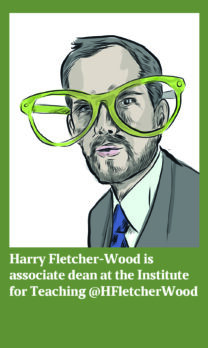Guest reviewer Harry Fletcher-Wood takes us through this week’s best education blogs.
Targets don’t work
Katharine Birbalsingh
In this lively polemic, Katharine Birbalsingh encourages senior leaders to ditch targets. She describes them as moving teachers’ attention to the wrong thing: demand Cs from a hard-to-teach class, and one of two things will happen: “If they take their target seriously, they’ll suddenly refuse to take in naughty kids from other classes . . . or they’ll stop doing that extra-curricular club for year 7 to pour all their energies into their target.”
Alternatively, they may forget about it until performance management season “because no one takes targets seriously at the school anyway”.
While Birbalsingh recognises the usefulness of targets for struggling staff, she invites senior leaders to “hold those who are failing to account with targets and let the others go free from the restrictive stranglehold that is performance management dictated by targets”.
Decision-making among jazz musicians, basketball players and teachers
Larry Cuban
Basketball players make decisions in fractions of seconds – and as we don’t see it, we assume their work is physical not cognitive, says Larry Cuban.
Turning to teachers, he notes: “Decisions tumble out one after another in questioning students, starting and stopping activities, and minding the behaviour of the class.” He cites one study that found that elementary teachers in the US have 200 to 300 exchanges with students every hour (up to 1,500 a day), most of which are unplanned, but which need a teacher decision. He concludes: “Effective teachers, then, like top jazz musicians and basketball rebounders improvise – decide in the moment – as they deal with both the routine and unexpected in the art of teaching”.
Practical: The fallacy of induction
Matt Perks
Matt Perks concludes a series of blogs looking at the problems of practical work in science by asking “Do children learn important science ideas and/or develop their understanding from seeing the theory ‘in the flesh’?” The problem, he notes, is that scientific theories are easy when you know them, but hard to generate from the evidence.
“It took a lot of very skilled scientific thinkers hundreds of years to do this the first time. What’s worse, children inevitably develop naive theories as they grow up, so in secondary school they are sometimes not just trying to learn correct scientific thinking, but are trying to un-learn naive thinking that serves them well outside the classroom.”
While it’s possible to “scaffold or adapt the activity sufficiently to allow children to see the wood”, Perks asks “whether a forest is the right starting place, or whether a nice piece of rough sawn timber from B&Q might be a better option”. He concludes that practical work rarely procures enough clarity in its results “to even begin to address these stubborn misconceptions”. However, he concludes by offering three justifications why they should be used.
Shakespeare and creative education
Daisy Christodoulou
Daisy Christodoulou examines Shakespeare’s education and what it is that allowed him to be so creative. She begins by tracing his simple imitation of classic texts and rhetorical figures in his early plays, noting that his first play, Titus Andronicus, is his “most learned”.
She shows how it was on this basis of deep knowledge and deliberate practice that Shakespeare was able to create novel and arresting phrases.
Christodoulou wonders whether, “Just as we have ‘gone back’ to performing Shakespeare’s plays as he wrote them… what might it look like if we were to ‘go back’ to a more Shakespearean mode of education?”
Seminal papers in educational psychology
Paul Kirschner
Finally, a special mention for this collection, a crowd-sourced list of dozens of key papers in educational psychology. While the number may seem a little intimidating, each comes with an a short abstract summarising its findings alongside a link to the full paper: from Ausubel to Zimmerman. An invaluable resource.













Your thoughts